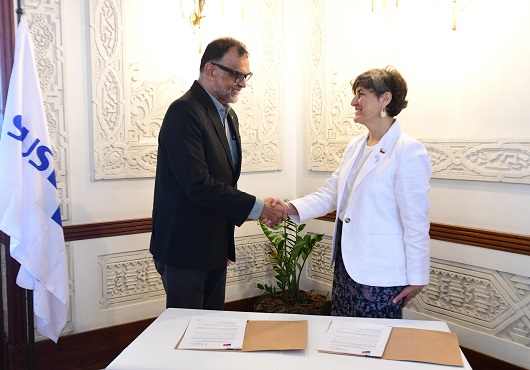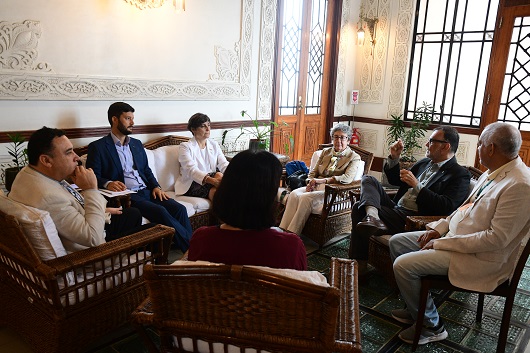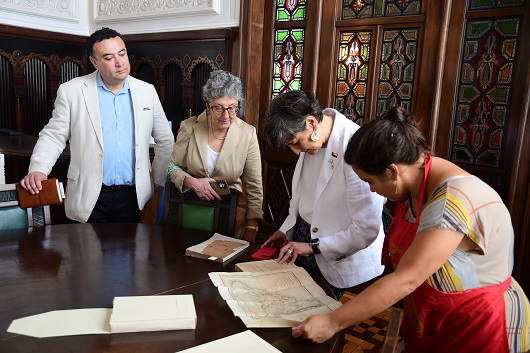Fiocruz and Chile's Ministry of Health sign agreement for international cooperation
05/12/2023
Cristina Azevedo (Fiocruz News Agency)
The president of Fiocruz, Mario Moreira, and the Chilean Minister of Health, Ximena Aguilera, signed a Memorandum of Understanding (MoU) on Wednesday (11/28) which paves the way for cooperation in education, research and development, as well as communication, information, management and policies in the field of health in general. Accompanied by the head of the Office of Cooperation and International Affairs, Raquel Child Goldenberg, and the consul Carlos Marín, the minister visited the Manguinhos Campus and met with representatives of the Foundation at the Fiocruz Global Health Center (Cris/Fiocruz). 
Mario Moreira and Ximena Aguilera sign the Memorandum of Understanding (photo: Peter Ilicciev)
The MoU lasts for five years and can be renewed. The document provides for the possibility of projects in various areas, such as research and development; epidemiology and surveillance of pathogens; pharmaceutical policies and production strategies; training and human resources; and health services. It also provides for actions to take place through technical assistance mechanisms; the exchange of experiences and statistical and research information; courses, seminars and technical visits. Therefore, specific agreements should emerge.
"This Memorandum of Understanding was built in full alignment with our Ministry of Health and will certainly be the first of many agreements sealed between us," said Mario Moreira. "The first goal is to organize a technical meeting to identify points of cooperation."
At the meeting with the minister, Moreira emphasized the need to strengthen regional production systems so that South American countries are less vulnerable to shortages of vaccines and equipment, as happened during the COVID-19 pandemic, as well as to strengthen epidemiological surveillance, recalling that Fiocruz is part of the World Health Organization (WHO) Hub for Pandemic and Epidemic Intelligence in Berlin.
The meeting happened at the Moorish Castle (photo: Peter Ilicciev)
The minister, in turn, highlighted her interest in various points, such as access to diagnosis and primary care. Chile wants to universalize primary care and has begun a project in around 20 municipalities. "This agreement is really important as it allows us to signal alignments for cooperation," said Ximena Aguilera. "We hope to have the support to develop capacities and also to support Brazil in the exchange of different, priority opportunities. We are talking about primary care, tobacco regulation and, ultimately, production: learning what they are developing on recovering the Latin American region's sovereignty capacity in production related to reducing the vulnerability in emergencies. This is a priority issue for both Brazil and Chile," she added.
Under the agreement, a special committee will be responsible for coordinating the development of specific programs and projects. It will comprise a representative from the Office of Cooperation and International Affairs of the Chilean Ministry of Health and another from the Fiocruz Global Health Center (Cris/Fiocruz).
At the meeting with Mario Moreira, at the Moorish Castle, the vice president of Education, Information and Communication (Vpeic/Fiocruz), Cristiani Machado, and the deputy coordinator of Cris, Pedro Burger, highlighted Fiocruz's structuring cooperation with institutions in other countries in the field of education for health professionals, both with postgraduate courses and in the training of technicians. In Latin America, for example, the Foundation has programs with institutions in Argentina, Peru, Uruguay and Paraguay. During the pandemic, the Virtual Campus trained more than 400,000 health professionals, not only in Brazil. The vice president of Environment, Health Care and Health Promotion (VPAAS/Fiocruz), Hermano Castro, emphasized the importance of working with the local population on warning models for soil and river contamination.
In the Library of Rare Works, two volumes of Travels in South America, by Alexander Caldcleugh, from 1825, attracted the attention of the Chilean minister (photo: Peter Ilicciev)
The signing was followed by a visit to the Moorish Castle, Fiocruz's headquarters. In the Library of Rare Works, the Chilean delegation was able to see books related to their country, such as Memorias del Manicomio de Santiago, from 1928, and two volumes of Travels in South America, by Alexander Caldcleugh, from 1825, which drew a lot of attention from the minister.
Ximena Aguilera also visited the Seminar on Advances and Challenges in Indigenous Health in Brazil, the Immunobiological Technology Institute (Bio-Manguinhos/Fiocruz), where vaccines, diagnostic kits and biopharmaceuticals are produced, and the COVID-19 Diagnostic Support Unit (Unadig), which was built during the pandemic in only 45 days and is now expanding its range of activities.
At the Fiocruz Global Health Center, the minister was able to learn more about Fiocruz's areas of expertise and international cooperation. She met with representatives from the Vice Presidencies for Education, Information and Communication (VPEIC), Production and Innovation (VPPIS), Research and Biological Collections (VPPCB) and Environment, Health Care and Health Promotion (VPAAPS). Units such as the Sergio Arouca National School of Public Health (ENSP/Fiocruz), the Institute of Scientific and Technological Communication and Information in Health (Icict/Fiocruz), the Institute of Drug Technology (Farmanguinhos/Fiocruz), the Joaquim Venâncio Polytechnic School of Health (EPSJV/Fiocruz), Bio-Manguinhos and the very Cris took part in the meeting.
Ximena Aguilera highlighted three priorities for her ministry: reducing the waiting lines for surgery and appointments, which, as in Brazil, have grown during the pandemic; mental health care, also related to disasters such as earthquakes and fires; and the universalization of primary care. Both sides of the conversation came away with an important piece of homework: to identify the main points of interest and single out one person to take the conversation forward.




